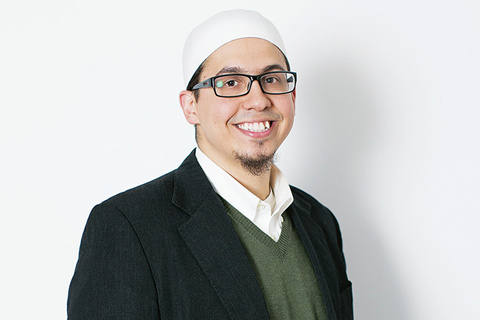You use the term chaplain to refer to yourself – is there an equivalent word in Islam? There’s a word, Ustadh, that means teacher, but there isn’t really an exact equivalent. The Muslim community in North America is still figuring out a lot of this terminology.
Does that mean that chaplain isn’t a traditional position for Islam? Historically, within the Muslim community, even within the example of the Prophet Muhammad, peace be upon him, there is an entire emotional/spiritual caregiver tradition. But the particular format that chaplaincy takes today is taking the meaning within that tradition and applying it to a new context. This position is exciting; it’s new territory.
How did you become U of T’s Muslim chaplain? I studied at a [non-denominational graduate school] in the United States called Hartford Seminary and a friend told me that a group of people in Toronto were putting something together. At that point that there was just a very basic website that you could put your email in and be on the email list. And I copied and pasted my entire resume in the little box! There was an interview process and in September of 2012 they offered me the position.
When you became the Muslim chaplain here in 2012, you were the only one in Canada, is that still true? I believe I’m the only full time, paid Muslim chaplain. Every other university that I’ve heard of, it’s been on a volunteer basis. It takes a big group to make something funded happen, but the other factor with any kind of non-profit is that it’s not easy to speak about the results. People’s emotional states, their spiritual states, are not something that you can translate tangibly. So it takes a little bit of time for the larger community to appreciate the benefits. But I’m confident that with time that will happen.
What’s the nature of the job? University is a great time of self-discovery and independence, but for a lot of people it can also be a bit of a shock. So to have resources there for students as they’re going through challenges is really critical. There’s a lot of conversation about mental health, which is extremely important. But from an Islamic perspective, we believe that human beings are made out of a body, a mind and a soul, and they’re not mutually exclusive. So when it comes to an individual’s holistic well-being, there’s a spiritual element that needs to be fulfilled. This is an important role of the chaplain that other services for students might not be able to provide.
Current events sometimes reveal an anti-Muslim bias in the media. How do you help students deal with this? The Qur’an teaches us, ‘Good and evil cannot be equal. Repel evil with that which is better.’ (Qur’an 41:34). So we have to be people who reflect goodness even in the face of ignorance and bigotry. Although these times are difficult for young Muslims carving out their own identity and purpose in life, I remind them to have faith, hope for positive change and understanding, and to focus on being positive contributors to society.
How large is your congregation? On Friday, I’m usually at the Multi-Faith Centre, and then there are two prayer services at Hart House. For each congregation, we have about two to three hundred people. Keeps me busy!
What resources does the Muslim chaplaincy offer? We offer classes and group discussions. Every week I’ll deliver a Friday sermon and lead the Friday prayers for students. Probably one of the most critical services we offer is one-on-one confidential counselling sessions. My focus would be coming from a point of Islamic spirituality, but our counselling is open to anyone who would like to talk, not exclusively Muslim students.
And what’s ahead for the future? The idea, God willing, is to have services at all three campuses. I’m at U of T Mississauga one day a week, but our goal down the line is to have a part-time chaplain at both UTM and UTSC. There’s a lot of room for growth, but we have to be careful not to spread ourselves too thin. It’s worth doing right.
Watch Amjad Tarsin speak on patience and learning to listen to others





